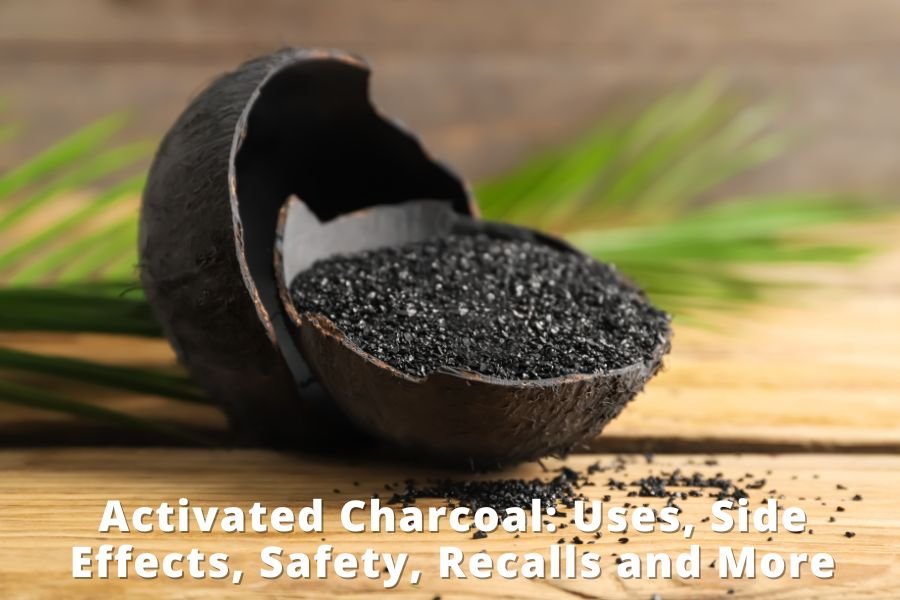
Activated charcoal has gained popularity in recent years for its various uses and potential health benefits. This article aims to provide an in-depth understanding of activated charcoal, its uses, potential side effects, safety considerations, recalls, and other important information.
Activated charcoal, also known as activated carbon, is a form of carbon that has been processed to have small, low-volume pores that increase its surface area, making it highly porous. This increased surface area allows activated charcoal to effectively trap and absorb various substances.
Activated charcoal is produced by heating carbonaceous materials, such as wood, peat, coconut shells, or sawdust, at high temperatures in the presence of gases such as steam. This process "activates" the charcoal by creating a network of pores and increasing its surface area.
Activated charcoal is commonly used for various purposes due to its adsorptive properties. It is widely used in medicine as a treatment for certain types of poisoning or overdose, as it can bind to toxins and prevent their absorption in the gastrointestinal tract. Additionally, activated charcoal is used in water purification systems, air filters, and various industrial processes where the removal of impurities or contaminants is necessary.
It's important to note that activated charcoal should be used with caution and under medical supervision, as improper use or ingestion can lead to adverse effects such as constipation, dehydration, or interference with the absorption of medications or nutrients.
Activated charcoal has a wide range of uses, both in medical and non-medical settings. In medical settings, it is commonly used in emergency situations to treat drug overdoses or poisonings. It can also be used to alleviate symptoms of gastrointestinal issues, such as gas and bloating.
Outside of medical settings, activated charcoal is used in various beauty and wellness products. It can be found in face masks, toothpaste, and even as a natural remedy for whitening teeth. Additionally, activated charcoal is sometimes used in water filtration systems to remove impurities.
While activated charcoal is generally considered safe for most people, it can cause some common side effects. These side effects may include:
In rare cases, activated charcoal may cause more severe side effects. These rare side effects may include:
While activated charcoal is generally safe for most people, it is important to consult with a healthcare professional before using it during pregnancy or giving it to children. The safety and dosage recommendations may vary depending on individual circumstances.
There have been instances of activated charcoal recalls in the past. These recalls are typically initiated due to concerns regarding product quality, contamination, or labeling issues. It is important to stay informed about any recalls and follow the instructions provided by the manufacturer or regulatory authorities.
Activated charcoal is considered a medical device by the U.S. Food and Drug Administration (FDA) when used for specific indications, such as treating drug overdoses. However, for other uses, such as dietary supplements or beauty products, FDA approval may not be required. It is important to look for reputable brands and products that meet quality standards.
Activated charcoal may be prescribed by healthcare professionals in emergency situations, such as drug overdoses or poisonings. It is used to bind and remove toxins or drugs from the gastrointestinal tract, preventing their absorption into the bloodstream.
The dosage and administration of activated charcoal may vary depending on the specific situation and individual factors. It is important to follow the instructions provided by healthcare professionals or the product packaging. Activated charcoal is typically administered orally in the form of capsules or as a suspension.
Besides its medical uses, activated charcoal has been explored for various other purposes. It is sometimes used in environmental cleanup efforts to remove pollutants from soil or water. Additionally, activated charcoal has been studied for its potential benefits in reducing cholesterol levels and alleviating symptoms of certain digestive disorders.
While activated charcoal is generally safe, there are some special precautions to consider. It is important to avoid taking activated charcoal with certain medications, as it may interfere with their absorption. It is recommended to wait at least two hours before or after taking other medications. Additionally, activated charcoal should not be used as a long-term treatment without medical supervision.
Activated charcoal should be stored in a cool, dry place, away from moisture and direct sunlight. It is important to follow the specific storage instructions provided by the manufacturer. When it comes to disposal, it is recommended to check local regulations for proper disposal methods, as activated charcoal may be considered a hazardous waste in some cases.
In case of an emergency or suspected overdose, it is important to seek immediate medical attention. Activated charcoal should not be used as a substitute for professional medical care in such situations.
While activated charcoal can be a useful tool in certain situations, it is important to remember that it is not a cure-all solution. It should be used under the guidance of healthcare professionals and in accordance with the recommended dosage and administration instructions. If you have any concerns or questions about activated charcoal, it is best to consult with a healthcare professional.
When used appropriately and under the guidance of healthcare professionals, activated charcoal is generally considered safe. However, it is important to use it responsibly and follow the recommended guidelines. As with any substance, misuse or excessive use of activated charcoal can potentially lead to adverse effects. It is always best to seek professional advice and use activated charcoal as directed.